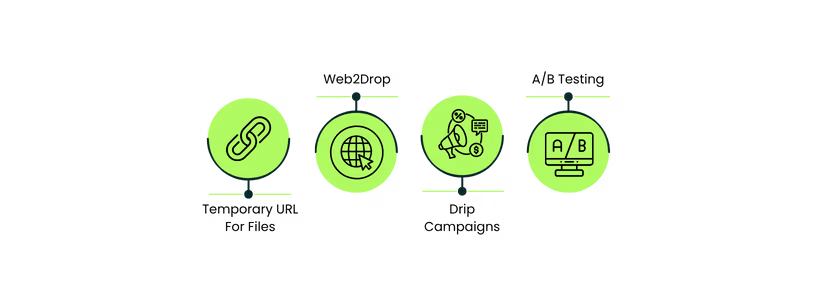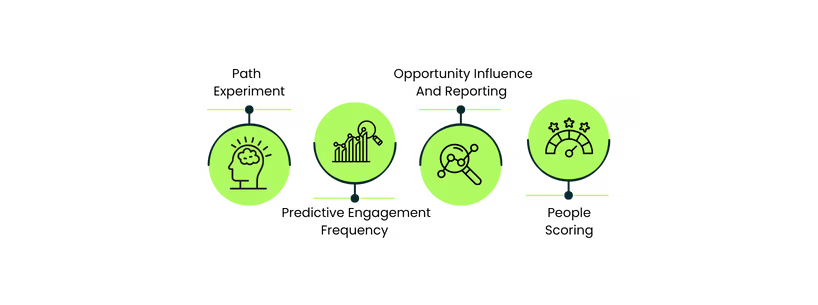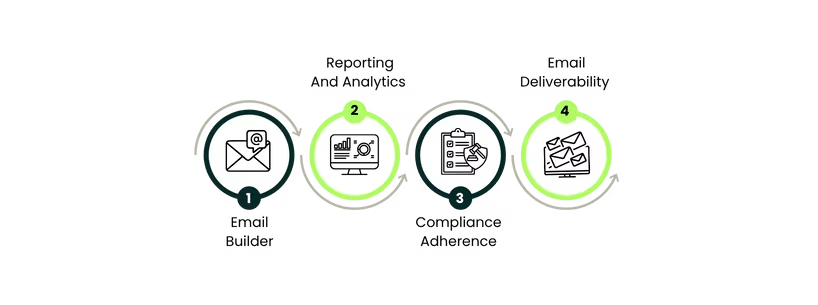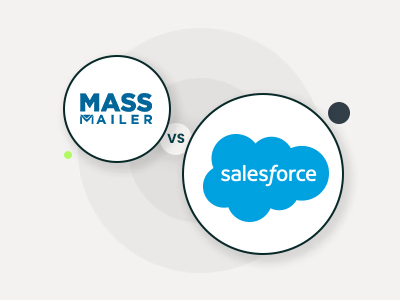
MassMailer and Salesforce Marketing Cloud are two marketing platforms that integrate with Salesforce and are often compared by Salesforce users. The former is a separate software built natively on Salesforce, allowing users to send and manage bulk emails, while the latter is one of Salesforce’s main offerings.
The main difference between the two is that MassMailer is for enhancing the existing email capabilities of a Salesforce module, while Salesforce Marketing Cloud is a complete solution on its own that helps with email marketing, advertising, and more.
In this MassMailer vs Salesforce Marketing Cloud guide, we will go over these two in detail, covering their main features, pros and cons, and pricing to help you decide which one best fits your needs.
Feature | MassMailer | Salesforce Marketing Cloud |
Email Builder | Drag-and-drop editor, WYSIWYG templates, mobile-responsive design | Content builder, pre-built templates, centralized asset management |
Reporting and Analytics | Open rate tracking, bounce and spam reports, unsubscribe tracking | Engagement metrics, real-time analytics, intelligence reports |
Compliance Adherence | DKIM/SPF/DMARC checks, MTA/IP analysis, domain reputation alerts | Brand guideline enforcement, GDPR compliance tools, policy adherence |
Email Deliverability | Pre-built templates, campaign fine-tuning, improved ROI focus | A/B/n testing, engagement scoring, subscriber preference management |
Best For | Businesses already using a Salesforce product and want to enhance its email capabilities | Businesses looking for a complete marketing solution |
MassMailer is a Salesforce-native platform that is designed to help businesses take control over the number of emails they can send to their customers. It offers a range of tools to assist teams with their bulk email marketing initiatives, such as email templates, alerts, and an email wizard. The software is a good choice for small to medium-sized businesses that already use Salesforce CRM and want to reach clients with bulk emails.
Unique Features Of MassMailer

- Temporary URLs For Files: Lets users give temporary access to people for certain files and documents
- Web2Drop: Enables users to upload files into MassMailer Docs directly from the web, allowing them to add resumes and proposals into the platform
- Drip Campaigns: Automatically sends a series of timed emails to nurture leads over time
- A/B Testing: Lets users test multiple emails to see which one performs better
Pros And Cons Of MassMailer
Pros:
- Integrates seamlessly with Salesforce’s ecosystem
- Shows essential metrics, like soft bounces, hard bounces, and open rates
- Allows users to segment clients and candidates for email campaigns
Cons:
- Businesses need to have clear processes in order to prevent mistakes
- If improper HTML is used, the templates will be shown different than how they are shown in Salesforce
Salesforce Marketing Cloud is an all-in-one marketing automation tool and is one of Salesforce’s main offerings. The platform is designed to help large organizations streamline customer engagement across different channels, including web, email, mobile, and ads. It also comes with powerful AI agents like ‘Einstein AI’ that connect different departments, consolidate data, and help make better marketing decisions. It’s an ideal choice for mid-to-large-sized businesses looking for a comprehensive marketing solution.
Unique Features Of Salesforce Marketing Cloud

- Path Experiment: Lets users test journeys to understand how their audience is interacting with their marketing assets
- Predictive Engagement Frequency: Uses AI to predict which customers are being bombarded by content, helping adjust the content frequency and lower the unsubscribe rates
- Opportunity Influence And Reporting: Helps gauge marketing’s impact on sales and analyze how people interact with landing pages, emails, and forms
- People Scoring: Analyzes the intent of every lead to score people based on how willing they are to buy a product or service
Pros And Cons Of Salesforce Marketing Cloud
Pros:
- Helps automate lead nurturing and scoring
- Allows users to track customer journeys and automate campaigns
- Enables teams to personalize email marketing and prioritize high-quality leads
Cons:
- The data processing time is very high, which can slow down associated tasks
- Reporting and analytics features are powerful, but can feel overwhelming for new users

MassMailer Pricing

The vendor offers three plans, along with a 15-day free trial. Here are the plan details:
Basic:
- 10,000 Emails: $219/month
- 25,000 Emails: $251/month
Pro:
- 10,000 Emails: $279/month
- 25,000 Emails: $311/month
- 100,000 Emails: $392/month
Premier:
- 10,000 Emails: $409/month
- 25,000 Emails: $441/month
- 100,000 Emails: $521/month
- 200,000 Emails: $649/month
- 300,000 Emails: $775/month
- 400,000 Emails: $902/month
- 500,000 Emails: $1,029/month
Disclaimer: The pricing is subject to change.
Salesforce Marketing Cloud Pricing
The vendor offers three pricing plans, along with a 30-day trial for the ‘Salesforce Starter’. Here are the plan details:
- Salesforce Starter - $25/user/month
- Marketing Cloud Next Growth Edition - $1,500/org/month
- Marketing Cloud Next Advanced Edition - $3,250/org/month
Disclaimer: The pricing is subject to change.
Both solutions are good at what they are designed for. We highly recommend you make a decision once you have clarity on what your exact requirements are and how you want your processes to be streamlined.
As a general rule, MassMailer is a good choice for small-to-medium-sized businesses already using a Salesforce product but are constrained by the number of emails you can send. You can use this software to significantly boost your email capabilities by leveraging features like Web2drop and temporary URLs.
Salesforce Marketing Cloud, on the other hand, is a complete marketing solution designed for large organizations that they can use for email automation, customer journey mapping, audience segmentation, and multi-channel campaigns.
